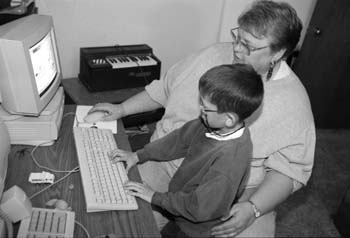![[Metroactive News&Issues]](/gifs/news468.gif)
[ Metro | Metroactive Central | Archives ]
Family Circle
 Skye Dunlap As the courts take children away from their parents, grandparents are stepping forward By Cecily Barnes Elementary school lets out in one hour, and 59-year-old Mary Edghill eases into her reclining chair to catch half an hour of rest before picking up her grandson Tommy. All morning, she's cleaned house and run errands. Once Tommy comes home, the rest of the day will pass in a whirlwind of snacks, homework, computer time, karate, Cub Scouts, dinner, bath, stories and prayers. While this schedule probably sounds par for the course for parents, most grandparents get tired just thinking about such an afternoon. Mary Edghill doesn't have that luxury. She, like dozens of older adults in the Santa Clara Valley, became her grandchild's sole guardian after Child Protective Services deemed her daughter an unfit mother. When the only other choice was to put Tommy in foster care, Edghill did what she says she had to do. Now she is parenting all over again, only 30 years older and on a fixed income. "I have a child at an age when I should be in retirement," Edghill says. "I didn't even get 30 days of retirement. But at the time, you don't think about it much. I just thought, this child needs me." Parenting at nearly 60 years old has been challenging for Edghill and Tommy; however, the duo's involvement with Positive Grandparenting has helped to ease the transition. The nonprofit organization holds support groups and family activities for grandparents who have become their grandchildren's primary caregivers, usually due to drug abuse or illegal activity by the parents. "Socially I don't fit in with the older people because I have a young child," Edghill says, "and I don't fit in with the younger people because I'm older and I don't have the energy they do." But Edghill's peers at Positive Grandparenting know just how it feels to be parenting a young child as an older adult. Edghill became Tommy's caregiver 30 days before she would have retired after 20 years with the California Department of Corrections. Tommy was 6 months old at the time, and he was kept at the hospital after the doctor determined he had lost two pounds. Because he began to thrive again under the hospital's care, a social worker investigated Tommy's parents and determined they were not fit to care for an infant. "They weren't feeding him," Edghill says. "Not enough food, not enough attention, not enough stimulus in general, just neglect." As soon as she found out, Edghill moved to San Diego and took temporary custody of Tommy, with plans to turn him over to his mom once she got her life together. But this never happened. Edghill's daughter repeatedly failed to meet the state's requirements for getting her child back. When Tommy was 2, Edghill adopted him. "You lose your relationship with your child," Edghill says sadly. "And you no longer have a grandchild, you have a child. You can no longer feed him cookies and send him home with mom." Perhaps one of Positive Grandparenting's most important jobs is to support older adults as they move through the painful process of legally fighting their own children. Perry says that grandparents come to her absolutely devastated by this task. Mary Cabral was one of those grandparents. After watching her daughter drag her three grandchildren through an 11-year methamphetamine addiction, Cabral finally took action for the children's sake. "I just got to the point where I stopped being in denial," Cabral says. "I finally reported her to Child Protective Services." Before this, however, Cabral supplied her daughter with money and finally an apartment, closing her eyes to the drug problem. Once she finally faced the situation, Cabral took one of the most painful steps of her life: She evicted her daughter and three grandchildren from her property. "She was homeless for two months, flying all over the state with these children," Cabral says. "Finally, because of lack of income, she ended up dropping off the kids with their great-grandmother." Today, Cabral shares custody of the children with their paternal grandmother and great-grandmother. Because all three women have such minimal income, they share the responsibility. And they turn to Positive Grandparenting for clothes and other help. "We just got computers for the kids--they were so thrilled," Cabral says. "Right away the 10-year-old says, 'Are we going to get the Internet? Do we have a printer and a scanner?' I thought, 'Oh my God.' " When the teenage years approach, the grandparents will need even more help. Many fear that the challenges teens face today will be too much for them. However, Positive Grandparenting will continue to provide support, speakers, classes and the sympathy of someone who's been there.
Positive Grandparenting can be reached at 408/324-0290. [ San Jose | Metroactive Central | Archives ]
|
From the January 21-27, 1999 issue of Metro.
Copyright © Metro Publishing Inc. Maintained by Boulevards New Media.